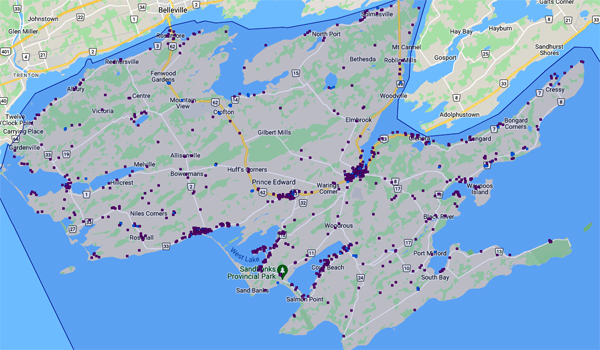Council approves new STA definitions; public mapping to July meeting
Administrator | Jun 21, 2021 | Comments 15
JUNE 22 UPDATE: Council has approved the bylaw change to define types of short-term accommodations immediately.
It also approved lifting the STA licencing pause only for bed and breakfast and owner-occupied STAs; and extend the whole-home licenses pause (time undetermined as yet).
The issues surrounding mapping were not discussed, as four meetings have not passed since the issue was before council. Staff has not completed its mapping report but it is scheduled to be brought to council in July, after the four-meeting constriction.
JUNE 21: Council will review a change to its current short-term accommodation bylaw that makes distinctions between bed and breakfast, owner-occupied and whole home settings with an aim to help enforce regulations.
It will also hear from STA owners who are concerned with the creation of a public map with STA locations and licensing numbers.
“The proposed bylaw would allow for the lifting of the STA licensing pause currently in place for some or all types of STAs,” notes a report by Noah Lister-Stevens, Community Programs Advisor to be presented at Tuesday night’s regular council meeting.
The proposed definitions, the report notes, are similar to those in other municipalities.
“Staff’s changes did not add any new regulations or change the substance of existing ones only rearrange or re-word those existing clauses for the sake of greater clarity to the bylaw.”
A more complete review and suggested program changes are anticipated after the ongoing STA market study is complete.
An owner-occupied STA could be defined as:
A short-term accommodation in a dwelling, or dwelling unit, that is located on the same lot as the dwelling, or dwelling unit, that the owner and operator has designated as their principal residence on their income tax filing and in other government records.
A whole home STA could be defined as:
A short-term accommodation in which one, or two dwelling units on the property are entirely occupied by accommodated guests.
A bed and breakfast STA could be defined as:
A short-term accommodation in a single detached dwelling in which the owner and operator occupies the dwelling, which provides no more than four guest rooms for the temporary accommodation of the travelling public, and which offers daily breakfast meals to accommodated guests and operates as one household unit.
The report notes that to date, 792 licensees have completed the licensing process (including denied and suspended licenses) with 180 still awaiting licensing.
Of this total of 972, 666 (69 per cent) are whole home STAs and 306 (31 per cent) are owner-occupied, or bed and breakfasts.
The report explains the current bylaw does not allow for significant differences between the treatment of different types of STAs. In May, council directed staff to create a report that would allow for a phased re-opening of STAs to new applications and to create and publish a map of all licensed STAs to be available for public access.
“Council’s decision to pause the licensing of new STAs as of Sept. 30, 2020 does not allow for a phased reopening process as all legally conforming STAs have to be treated more or less identically,” the report states. “Legal counsel for the municipality further advised staff that changing the bylaw in a way that would permit this differential treatment would likely be too much of a departure from the original bylaw for a simple amendment, and that rescinding and rewriting the bylaw was the only option.”
“Rescinding and passing the STA bylaw with these revised definitions would permit council the flexibility to lift the STA licensing pause in phases — for example, permitting licensing of B&Bs and owner-occupied STAs only, while extending the licensing pause for whole home STAs. It will also enable management of each STA type individually, such as permitting council to enact different caps on the number of each type of STA licenses issued in a year.”
The report suggests the bylaw could come into effect immediately, or on Jan. 1, 2022, but staff encourage January to give a six-month notice to STA owners.
The report reveals “overwhelming feedback from STA owners”, the majority opinion of unease and discomfort with the mapping proposal, specifically around private information and addresses.
“Some operators were further concerned about threats or use of violence against STA owners should home addressed by published,” stated Lister-Stevens.
“While legal counsel has assured the municipality that this is policy is in its power, it is worth emphasizing that the proposal only concerns listing the STA address and license number, not the name of the owner, telephone numbers or contact information (though contact info, such as telephone numbers and email addresses, is collected by the County for use of the STA office, it would not be part of the publicly available map service).
“That said, legal counsel has further advised staff that this is not an unlawful use of private information. Business information, including businesses based out of a home, is not considered private information under both the current STA bylaw and under the Municipal Freedom of Information and Protection of Privacy Act.
“Concerning the risk of violence against STA operators, staff also reached out to STA offices in both Huntsville and Niagara-on-the-Lake — two examples of municipalities in Ontario that publish regularly-updated lists of licensed STAs. Staff was informed that there had been no reported threats, harassment, or incidences of violence against STA owners in any way that could be tied to their presence on a map or list, nor could any obvious cases of this be found in other jurisdictions that have enacted STA-mapping services.
Lister-Stevens said it is further worth noting that Huntsville, which has enacted a mapping service far more comprehensive than the County is currently in the process of implementing (e.g. names, number of approved rooms, expiry dates and phone numbers) also reported no incidences of criminality towards STA owners based on this available information.
Also on the agenda is a deputation from Davelle Morrison representing the Licensed Short-Term Accommodators of Prince Edward County (more than 190 members offering more than 500 bedrooms).
That deputation is speaking to increased risks to owners, harassment of guests, risk of vandalism in the off-season, incentive for unlicensed STA owners to remain underground and increased risk to already marginalized communities. The deputation notes that of owner-occupied STAS, 67 per cent in PEC are women; 25 per cent are retired, and many are from the LGBTQ2S+ community.
The deputation states the best practice would be for Airbnb to add license numbers to listings to make it easier to track unlicensed STAs. On Airbnb, addresses and phone numbers of STAs are revealed only after booking has been completed.
Council meets at 7 p.m. Tuesday and the meeting can be viewed on the municipality’s website and YouTube channel.

A map from AirDNA May 13 shows 578 active rentals in Prince Edward County using data from airbnb (72 per cent) Vrbo (12 per cent) and 16 per cent listed on both.
Filed Under: Local News
About the Author:
































Fully agree with your latest comment Dennis but I would note that the accommodation tax is already in place – 4% (as permitted by the province) and 50% net of costs has to go to promote tourism. (No – I didn’t make this up!). It is also interesting to note that under most home businesses as defined in the Comprehensive Zoning Bylaw the maximum area of the residence that can be used for the business is 25%. Unfortunately this doesn’t apply to accommodation activities but if the bylaw were changed it would – and then maybe they would have to pay commercial tax rates and the BIA assessments.
That’s a County mindset Dennis. Toronto folks rarely know their neighbours or have a desire to do so.
The point that is being missed (I think) is that having a neighbourhood with one or two rental homes (or rooms) makes it feel that for those who live there year round, that their neighbours are constantly changing. Having more rental units in the same area makes it a reality that your never know your neighbour – which destabilizes a community. And this is what is happening now in PEC. Compound this with absentee landlords who don’t pay a cent more in taxes to run their business in a residential area is taking advantage of the neighbours they never get to know. Add these addition tourists to our roads, hospital, using an infrastructure that was never designed for this heavier use – then it adds up that the year round residents are paying for and subsidizing the landlords and the tourists. If you wan to run a business then pay for it, if you want to vacation here, then pay for it. The faster council passes these rental taxes, the better for all of us. But I still believe there has to be a limit to the number of rental units.
The distinction and pause of Whole-Home STAs was the right decision by Council and positively a small step in the right direction for the County, as evidenced by what other smart municipalities have done with terrific results and outcomes for communities and residents: ban and phase out Whole-Home STAs. We need these by-laws to be resident-centred, not investor-centred. This was a move in that direction.
Whole-Home STAs are not fair to legitimate hotel & motel operators who actually create real jobs in greater numbers; they destroy the character of communities by way of nuisances, crime, and noise; and there’s no way around it – they devour housing supply that should be used for *homes*, not black-market commercial motels in residential zones.
Despite what Whole-Home STA owners say about their properties not sucking up housing supply, the evidence in other jurisdictions where Whole-Home STAs have been banned shows the opposite: that nearly half of those homes are converted to long-term rentals. Imagine the impact of the 1000-2000 STAs in PEC becoming long-term housing for residents who need it! Now imagine how much time and money it would require to create that same amount of housing by way of construction and planning.
It’s everybodys business if a business is operating in their neighbourhood. That’s just common sense.
Let all of them manage themselves as in the past before council decided to overreach into people’s homes and bedrooms. Charge a tax on all of them. They come and go, yearly changing, people realizing it’s maybe not for them. Less admin overhead,simple,profitable for the county. The customers will decide if it sinks or swims. Council will instead pay thousands of dollars doing endless studies.
In response to Sarah’s comment there are about 2,000 STA’s in operation in The County – half of them unregistered. If the registered STA’s are listed it will be relatively easy for people to report the unregistered and for them to be closed down. The costs of running the STA approval/inspection are paid by the registered STA’s so if all STA’s were registered the individual costs could reduce. If you are registered and legal and your guest are not creating problems you should have nothing to worry about.
I am not sure what council would put up with such a thing.
The proliferation of e scooters in Wellington is a perfect demonstration of councils planning approach: Wait for 3 years and act surprised when you finally have to admit that something is a problem.
Next election can’t come quick enough.
I think some of you who are making negative comments about the STA’s here in Prince Edward County need to stop and think about the local people who are running STA’s as well. Hate to break it to you but it’s not all big, bad, scary city folk. I am a local who rents out my place for 3 months of the summer in order to afford to continue to live here. Why is it any of your business where my house or “STA” is located? Let council tell you numbers but actual location is an invasion of privacy and as a local (and a woman who is not threatening council with discrimination) I find it completely unnecessary and invasive.
So far there appears to be 666 homes that are STAs that are not owner occupied out of a total of 972. It certainly seems that the saturation point for STAs had been achieved…..Many of these homes sit empty for half the year or the owners attempt to rent them short term in the down season……most of these homes were once affordable year round family homes……It is time council says enough, no more STA licenses and produce the map for residents to know just who is or isn’t playing by the rules…..
I believe it is time for council to pass a bylaw governing the number allowed within a radius of each other(no grandfathering), establish a fair and profitable tax for the municipality, with clear and enforceable rules – and to get on with it now.
Time to publish the list so we understand the depth of the impact on neighborhoods. Perhaps some of the hesitation is from illegal operators.
Lyn best comment I have ever read enough is enough no more STAs we need people to have secure homes to help rebuild our washed out communities.
When this whole STA thing started, Shire Hall PROMISED the location of STAs would be made PUBLIC. I have requested a list of STAs in my neighbourhood and have been told I have to make a Freedom Of Information request which I have done. I don’t care about personal details, just locations.
Aside from the $5. application fee, which I’ve paid, I’m now told it’s going to cost me an admin fee to get this info.
I’m waiting…
Reading article seems odd the STA Group bring up LBGTQ and women owners. Are they in an underhanded way threatening council with discrimination? How many women and children or LBGTQ people have been forced out of rental housing due to 500 BEDROOMS removed from the market. We have enough STA now. It is time for housing and rentals to stabilize.